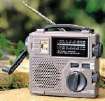rain day along the creek. Can't complain we need it bad! I did get out for a while to wallow World. I could not get over them creating a whole new department for the MP3 craze griping the world. Young and old have fallen for this tiny box that can hole thousands of song, pictures, movies, and some you can make a phone call on or get e-mail, or IM!
All this lead me too think of where we've come from...
The first radio Guglielmo Marconi: radio starSpecial Feature by Roger Bridgman: December 2001 Physics Web.The author Roger Bridgman writes on science and technology from the UK. He was formerly Curator of Communications at the Science Museum, London.
A lack of formal education, high-powered family connections and an unstoppable will to succeed helped Guglielmo Marconi to transmit the first radio signal across the Atlantic and launch the wireless-communications industry.
There cannot be many people who screwed up at school, failed to get into university, and then went on to win a Nobel Prize for Physics. But at least one did, and with good reason: he made radio happen. In a few years of manic activity, Guglielmo Marconi managed to transform an obscure piece of maths into a social upheaval that makes the 'dot.com' phenomenon look about as radical as a new bike for your postman.
Marconi's 1909 Nobel prize seems all the more extraordinary when you consider that - unlike the physicist he shared it with, Ferdinand Braun - Marconi was not, by his own admission, any kind of scientist, or even much of an inventor. He did not really make any fundamental discoveries, and radio was mostly a matter of assembling parts created by other people. But the vision needed to see the possibilities of a new era of communication, and the unstoppable will to pursue it, were all his own. No intellectual, Marconi earned his Nobel prize the hard way by dragging a great chunk of physics out of the lab and holding it up for the world to see, approve and, more importantly, buy.
It was all a long time ago. In fact it is 100 years since Marconi proved, contrary to informed opinion at the time, that wireless waves could cross the Atlantic. Since then, radio has undergone a bumpy ride in the fashion stakes. Some 40 years ago, it was seen as ancient history and distinctly uncool, despite the invention of the transistor. Computers were the upcoming thing for ambitious scientists and engineers. Digital chips were hip; coils and capacitors were not.
But radio never went away, and today it is chic and centre stage again. It even gets called "wireless" by a generation that no longer associates the word with a wooden box that took ages to warm up. Bluetooth wireless technology may one day allow every conceivable electronic gadget to talk effortlessly to every other, while digital transmission is revolutionized television and will do the same for sound as soon as someone markets a receiver that does not require a second mortgage.
But the radio application that's had more impact than any other is, of course, the mobile phone. And, in a satisfying display of closure, this three-way marriage of radio, computers and the fixed phone network has enabled millions of texting teenagers to put life back into the concept that started it all: wireless telegraphy. Making waves just how did "wireless" and "telegraphy" get together? Like a horseless carriage, a wireless telegraph proposes to do away with the very thing that makes the technology work. Pursuing an idea like this demands the ability to enter a new world, not just optimize an old one. The Moravian-born US economist Joseph Schumpeter reserved the term "entrepreneur" for people with this gift. He saw them as prime movers of economic change, though their motives were not entirely economic. What drives the true entrepreneur is their dream of a personal kingdom, the spirit of conquest, the sheer joy of achievement. Guglielmo Marconi fits Schumpeter's model down to the last detail and he changed the world economy every bit as much as that model predicts.
It was all a long time ago. In fact it is 100 years since Marconi proved, contrary to informed opinion at the time, that wireless waves could cross the Atlantic. Since then, radio has undergone a bumpy ride in the fashion stakes. Some 40 years ago, it was seen as ancient history and distinctly uncool, despite the invention of the transistor. Computers were the upcoming thing for ambitious scientists and engineers. Digital chips were hip; coils and capacitors were not.
But radio never went away, and today it is chic and centre stage again. It even gets called "wireless" by a generation that no longer associates the word with a wooden box that took ages to warm up. Bluetooth wireless technology may one day allow every conceivable electronic gadget to talk effortlessly to every other, while digital transmission is revolutionizing television and will do the same for sound as soon as someone markets a receiver that does not require a second mortgage.

First radio











 Blue tooth ear phone
Blue tooth ear phone


 The future
The future
 the past
the past
So much to cover, I didn't even touch on Ham and Cb radio, surround sound five six and seven! Last pic. Car stereo with out the car!

Thought for the day, again we are reminded the only constant is change!
All this lead me too think of where we've come from...
The first radio Guglielmo Marconi: radio starSpecial Feature by Roger Bridgman: December 2001 Physics Web.The author Roger Bridgman writes on science and technology from the UK. He was formerly Curator of Communications at the Science Museum, London.
A lack of formal education, high-powered family connections and an unstoppable will to succeed helped Guglielmo Marconi to transmit the first radio signal across the Atlantic and launch the wireless-communications industry.
There cannot be many people who screwed up at school, failed to get into university, and then went on to win a Nobel Prize for Physics. But at least one did, and with good reason: he made radio happen. In a few years of manic activity, Guglielmo Marconi managed to transform an obscure piece of maths into a social upheaval that makes the 'dot.com' phenomenon look about as radical as a new bike for your postman.
Marconi's 1909 Nobel prize seems all the more extraordinary when you consider that - unlike the physicist he shared it with, Ferdinand Braun - Marconi was not, by his own admission, any kind of scientist, or even much of an inventor. He did not really make any fundamental discoveries, and radio was mostly a matter of assembling parts created by other people. But the vision needed to see the possibilities of a new era of communication, and the unstoppable will to pursue it, were all his own. No intellectual, Marconi earned his Nobel prize the hard way by dragging a great chunk of physics out of the lab and holding it up for the world to see, approve and, more importantly, buy.
It was all a long time ago. In fact it is 100 years since Marconi proved, contrary to informed opinion at the time, that wireless waves could cross the Atlantic. Since then, radio has undergone a bumpy ride in the fashion stakes. Some 40 years ago, it was seen as ancient history and distinctly uncool, despite the invention of the transistor. Computers were the upcoming thing for ambitious scientists and engineers. Digital chips were hip; coils and capacitors were not.
But radio never went away, and today it is chic and centre stage again. It even gets called "wireless" by a generation that no longer associates the word with a wooden box that took ages to warm up. Bluetooth wireless technology may one day allow every conceivable electronic gadget to talk effortlessly to every other, while digital transmission is revolutionized television and will do the same for sound as soon as someone markets a receiver that does not require a second mortgage.
But the radio application that's had more impact than any other is, of course, the mobile phone. And, in a satisfying display of closure, this three-way marriage of radio, computers and the fixed phone network has enabled millions of texting teenagers to put life back into the concept that started it all: wireless telegraphy. Making waves just how did "wireless" and "telegraphy" get together? Like a horseless carriage, a wireless telegraph proposes to do away with the very thing that makes the technology work. Pursuing an idea like this demands the ability to enter a new world, not just optimize an old one. The Moravian-born US economist Joseph Schumpeter reserved the term "entrepreneur" for people with this gift. He saw them as prime movers of economic change, though their motives were not entirely economic. What drives the true entrepreneur is their dream of a personal kingdom, the spirit of conquest, the sheer joy of achievement. Guglielmo Marconi fits Schumpeter's model down to the last detail and he changed the world economy every bit as much as that model predicts.
It was all a long time ago. In fact it is 100 years since Marconi proved, contrary to informed opinion at the time, that wireless waves could cross the Atlantic. Since then, radio has undergone a bumpy ride in the fashion stakes. Some 40 years ago, it was seen as ancient history and distinctly uncool, despite the invention of the transistor. Computers were the upcoming thing for ambitious scientists and engineers. Digital chips were hip; coils and capacitors were not.
But radio never went away, and today it is chic and centre stage again. It even gets called "wireless" by a generation that no longer associates the word with a wooden box that took ages to warm up. Bluetooth wireless technology may one day allow every conceivable electronic gadget to talk effortlessly to every other, while digital transmission is revolutionizing television and will do the same for sound as soon as someone markets a receiver that does not require a second mortgage.

First radio











 Blue tooth ear phone
Blue tooth ear phone


 The future
The future  the past
the past So much to cover, I didn't even touch on Ham and Cb radio, surround sound five six and seven! Last pic. Car stereo with out the car!

Thought for the day, again we are reminded the only constant is change!

0 Comments:
Post a Comment
<< Home